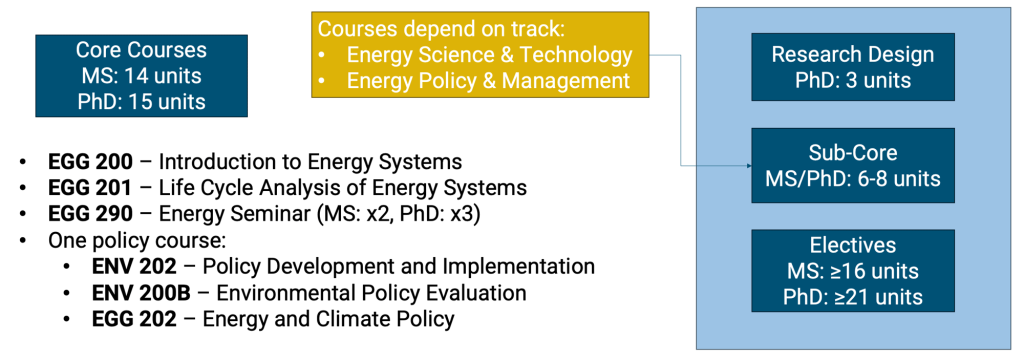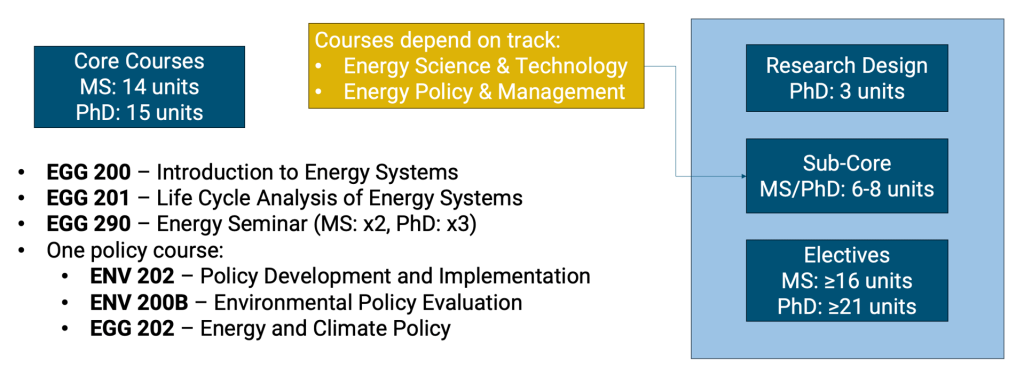- Home
- »
- Education
- »
- Energy Graduate Group
- »
- FAQ
FAQ
For Applicants: General Information
The Energy Systems program at UC Davis seeks to prepare students and professionals with the knowledge, skills, and training needed to advance the energy sector. The program is unique in its approach because it is highly interdisciplinary in nature, and as a result has produced leaders in the energy field across many different sectors including government, industry, and academia.
The ideal candidate for our MS or PhD program in Energy Systems is an individual with a background in engineering, environmental sciences, computer science, social sciences, or policy, who has a strong interest in sustainable energy solutions. This program is designed for those who are driven by the challenges of enhancing energy technologies and striving for a sustainable energy system. We value candidates who bring diverse perspectives and are committed to advancing both the technical and societal aspects of energy systems.
The Energy Systems program is intimately connected with the Energy Efficiency Institute, and thereby is well-connected to many opportunities in the broader energy landscape. Students from our program have gone on to work at utilities (PG&E, SMUD), thinktanks and consulting agencies (EPRI, RMI, ICCT), NGOs (Union of Concerned Scientists), government agencies (CEC, CPUC), and many, many more!
Admission Requirements
We require applicants for the Master’s degree achieve an undergraduate cumulative GPA of 3.0 while applicants for the Doctoral program achieve a GPA of 3.5 – though exceptions can be made. There are background prerequisite courses for topics including econometrics and statistics, but if students do not have the requisite background, these prerequisites can be fulfilled during their first year of graduate studies.
Our program does not have a requirement for work experience prior to applying. Students in the Energy Graduate Group come from a variety of backgrounds, and we
have a diversity of students that range from directly out of undergrad to returning to school from industry or government. This ensures a rich set of perspectives that has proven invaluable for our students.
See application checklist: https://energy.ucdavis.edu/education/energy-graduate-group/apply-to-the-energy-graduate-group/ (link? Or just provide directly here) Complete the UC Davis online application.
- Request and submit three letters of recommendation.
- Submit a Statement of Purpose and Personal History Statement.
- Upload academic transcripts from all prior institutions.
- Pay the application fee. ($135 for U.S. residents or $155 for international students)
- Send required English language test score to UC Davis. (International students only)
- Need funding?
Application Process
To apply, go to the Graduate Studies online application and submit all required items in the checklist above. There are two deadlines: 1) January 15 – the priority deadline where applicants will receive a priority review. Apply by this date for funding consideration . PhD appliants should apply by this date. 2) April 1 – this deadline will not be reviewed on a priority basis. Late applicants past April 1 will only be considered if the graduate program determines that there is additional space available.
Yes, applicants are eligible to receive fellowships. In fact, the majority of EGG students (both Masters and PhDs) receive (but are not guaranteed) some type of funding offer to to cover part of their graduate program costs.
Contacts for the application process:
Alan Meier (Admissions Chair) – akmeier@ucdavis.edu
Alan Jenn (Program Chair) – ajenn@ucdavis.edu
JoAnna Lewis (Graduate Program Coordinator) – jrlewis@ucdavis.edu
Program Details
The course requirements can be seen below:

Generally speaking, MS students must take either 36 units (if they are on Plan I: Thesis Track) or 38 units (if they are on Plan II: Comprehensive Exam Track). PhD students are expected to complete 45 units to finish their course requirements.
Yes, the course requirements for EGG are designed to be flexible for students, allowing them to pursue their specific interests. While all students are required to take a small number of core courses, sub-core courses can be selected on the basis of their track choice, and electives can be selected on the basis of their research interests.
More details can be found in the degree requirements for our program.
Typically, Master’s students take 2 years to complete the program while Doctoral students take 4 to 5 years to complete the program on average. These graduation times can vary depending on each students’ personal circumstances.
For Current Students
Major Professor – The major professor is your primary advisor for research and will provide guidance in putting together your thesis (MS) and your dissertation prospectus and dissertation (PhD). They will also provide advice on classes that may complement your research during your graduate career.
Graduate Advisor – The graduate advisors’ primary duty is to work with you to design a program of study. This will ensure that you fulfill both your course requirements while simultaneously meeting your interests and research needs. The current graduate advisors are: Prof. Julia Fan (Science and Technology Track – jzfan@ucdavis.edu) and Prof. Frank Loge (Policy and Management Track – fjloge@ucdavis.edu). Prof. Alan Jenn (ajenn@ucdavis.edu) and Prof. Alissa Kendall (amkendall@ucdavis.edu) can both act as graduate advisors as well.
Graduate Program Coordinator – The grad program coordinator is the primary point of contact for administrative and student support needs of the student. If you need guidance on policies, procedures, required paperwork (i.e. program of study, committee membership, etc.), the graduate program coordinator can help with this. JoAnna Lewis (jrlewis@ucdavis.edu) is the coordinator for the EGG program.
Chair – The chair manages the program, essentially making sure that things are happening the way they should. If students have any concerns related to the program, they can reach out to the chair to discuss. The current chair of EGG is Alan Jenn (ajenn@ucdavis.edu).
Graduate Student Representative* – Graduate student reps are not official advisors in any capacity, but are nonetheless valuable sources of information from your peers. Consider talking to your rep for advice!
- Choosing your thesis topic or project is an important decision that shapes your academic journey. We recommend starting by identifying your areas of interest and the questions you are passionate about exploring. Engage with your coursework and attend seminars to gain deeper insights into potential topics. Discuss your ideas with faculty members, advisors, and peers to refine them further. Additionally, consider the relevance of your topic to current challenges in energy systems and its potential for practical impact.
The course requirements can be seen below:

Generally speaking, MS students must take either 36 units (if they are on Plan I: Thesis Track) or 38 units (if they are on Plan II: Comprehensive Exam Track). PhD students are expected to complete 45 units to finish their course requirements.
To get involved in faculty research projects, we encourage you to proactively reach out to faculty members whose interests align with your own. Explore the faculty profiles on our website, as well as exposure through courses and office hours to learn more about their research areas and current projects. We recommend initiating contact by email or office hours, introducing yourself, and expressing your interest in their work. Include a brief overview of your background and how it relates to their research. This approach not only shows your initiative but also opens up opportunities for meaningful collaboration and mentorship within our program.
- Internship opportunities and industry collaborations are abundant in our program, thanks to the extensive network provided by the Energy Efficiency Institute (EEI) and our faculty’s connections. Almost all of our Energy Systems Graduate (ESG) students who seek internships secure positions, benefiting from the broad spectrum of collaborations with industry and government partners across our various research centers. To explore these opportunities, we encourage you to engage with faculty members and discuss their industry links that can help you get your foot in the door. Additionally, connecting with fellow students to learn about their internship experiences can provide valuable insights and guidance on securing a position that aligns with your career goals.
Funding opportunities for students in our program are varied and designed to support your academic progress and research activities. Here are three primary sources of funding available:
- Graduate Student Researcher (GSR): This role involves working on research projects under the guidance of a faculty member, often directly related to your thesis or dissertation. It not only provides a stipend but also often covers tuition costs. GSR positions are excellent for gaining hands-on experience in your field of study while contributing to significant research outcomes.
- Teaching Assistant or Reader: As a Teaching Assistant (TA), you will assist professors with the delivery of courses, including leading discussion sections and managing laboratory work. Readers are primarily responsible for grading assignments and exams. Both roles offer a stipend and, in many cases, tuition remission. These positions are perfect for those looking to enhance their teaching skills and understand educational processes in higher education. Note: TA positions are housed in academic departments with undergraduate programs. Graduate groups do not have TA or reader positions.
- Fellowships: The program offers various fellowships, both internal and external, to support your studies. Internal fellowships are funded by the university or specific departments and are awarded based on academic merit or financial need. External fellowships are available through industry partnerships, professional associations, and government agencies, providing additional opportunities for financial support and professional development.
We encourage you to explore these options and discuss with your advisors and departmental staff to identify the best fits for your academic and professional aspirations.
